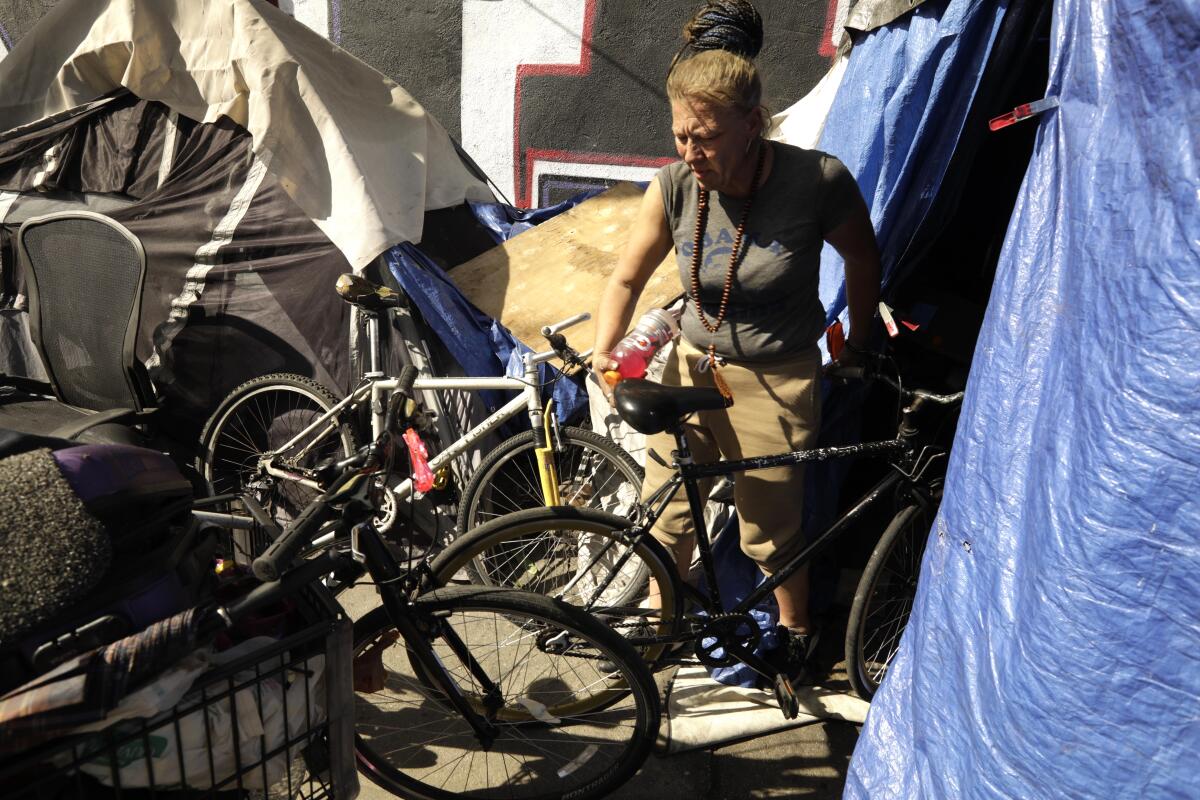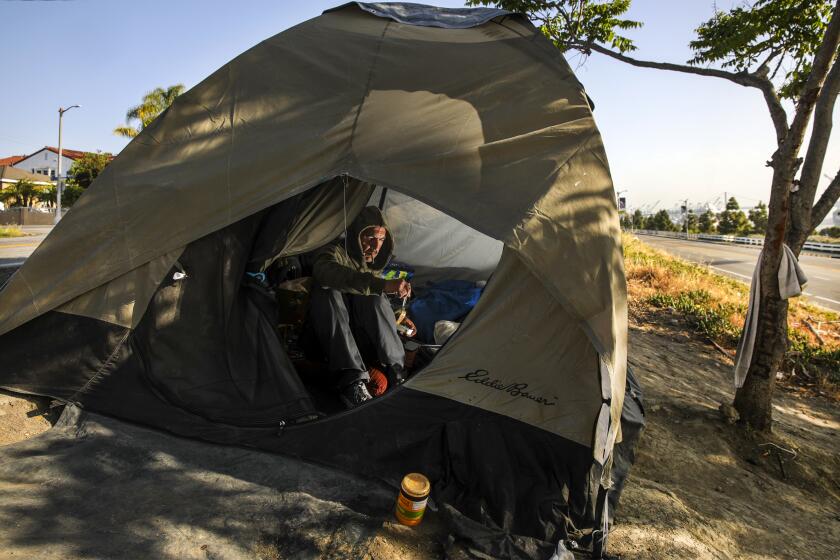L.A. council votes to ban dismantling, selling bicycles on streets amid crime concerns

- Share via
The Los Angeles City Council voted on Tuesday to prohibit the sale and repair of bicycles on city streets, a move critics say would unfairly target homeless people.
The measure, approved on a 11-3 vote during a special meeting, aims to deter bike thefts in the city and “open-air bicycle chop shops,” places where people dismantle stolen bicycles, sell the parts or reassemble them to be sold.
Homeless advocates and other critics say existing laws make bike thefts illegal and that the new measure, if signed by Mayor Eric Garcetti, would mostly target indigent people who earn money by repairing and assembling bicycles on the streets. They also fear it will encourage police to profile people of color in low-income areas.
The new law would exempt people with valid business licenses or who have to repair a bicycle that broke down while riding it on the street.
Councilmember Joe Buscaino, who introduced the motion last fall, said chop shops have become a pervasive problem in the city, and a new ordinance was needed to help Los Angeles police officers address it. He said recovering stolen bikes is difficult because bike owners don’t document the serial numbers and thieves file them off.
“It makes it difficult for police officers to prove a specific bike matches the description of the one reported stolen,” Buscaino said.
He said the new law, which is modeled after a similar one in the city of Long Beach, would target people in possession of five or more bicycle parts, a bicycle frame with the gear cables or brake cables cut, two or more bicycles with missing parts, or three or more bicycles on public property.
“I believe this ordinance will give the LAPD the necessary tools to reduce bike thefts, clean up our streets and improve the quality of life for residents of the city,” Buscaino said.
On a strip of dirt called the Gulch, along Gulch Road in San Pedro, homeless people face a city deadline and an uncertain future.
At the meeting, speakers expressed anger toward some council members for supporting the new law on the day they were also adding new anti-camping zones in and around popular shopping areas of West L.A.
“I honestly could not think you guys could get more heartless,” one woman told the council during public comment. “But every week, I’m more and more disgusted by this group of ghouls.”
Councilmembers Curren Price, Mike Bonin and Nithya Raman voted against the new ordinance.
In a statement, Raman said the ordinance was “pure political theater — a way to look like the council is doing something to address the very real problem of bike theft, without actually addressing the problem.”
“There are real potential investments that we could make to prevent bike thefts, like bike storage lockers at transit hubs and other infrastructure on city streets,” she said. “Instead, we have created an ordinance which is extremely unlikely to actually reduce bike theft, and to be selectively enforced, against people of color and people experiencing homelessness.”
Across the city, encampments with large numbers of bikes have sprung up in recent years. Some frustrated residents say these bikes are often stolen and then resold. Los Angeles averages about 2,000 to 2,500 reported bike thefts per year, according to a Times analysis of crime data, and many others go unreported.
The Los Angeles Police Department does not have a unit dedicated to bike theft, and over the past several years, 96% of bike thefts have gone unsolved, according to the Times analysis. Half of bike thefts are reported in two South L.A. and two Westside police divisions.
Neighborhood councils across the city were mixed on the new law.
For the record:
10:57 p.m. June 14, 2022A previous version of this story attributed a statement in support of the law to the Atwater Village Neighborhood Council. That statement came from the Sunland-Tujunga Neighborhood Council.
In a statement to the city, the Sunland-Tujunga Neighborhood Council wrote that it was supporting the law partly because of the growing “number of RVs across the city which are overloaded with bicycle parts and selling them on the street.”
The North Westwood Neighborhood Council released a statement saying the ordinance would have little effect since legal tools already exist to address bike thefts and chop shops, since it’s illegal to purchase stolen items.
“Instead, this motion would make illicit, in most circumstances, the street sale of and repair of all bicycles and would imperil and cast suspicion on street vendors of non-stolen bicycles, who often serve poor riders,” the statement read. “Obtaining and servicing low-cost bicycles is vital for many low-income travelers and travelers of color.”
If Garcetti signs the measure, it will go into effect 30 days later.
Staff writers Benjamin Oreskes and Kevin Rector contributed to this report.
More to Read
Sign up for Essential California
The most important California stories and recommendations in your inbox every morning.
You may occasionally receive promotional content from the Los Angeles Times.












